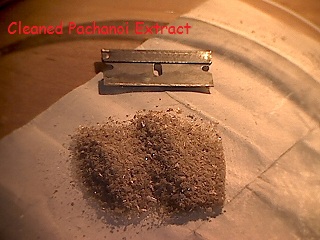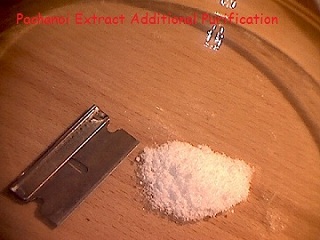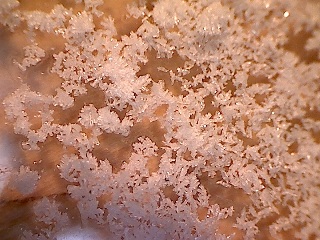Difference between revisions of "Kash's A/B Mescaline Extraction"
(→Pictures) |
(→Procedure) |
||
| (17 intermediate revisions by one user not shown) | |||
| Line 1: | Line 1: | ||
{{ShowInfo|[[Image:Note_error.png]]|'''Note:'''|This page is a transcription of Kash's A/B Mescaline Extraction <ref>Kash's A/B Mescaline Extraction | {{ShowInfo|[[Image:Note_error.png]]|'''Note:'''|This page is a transcription of Kash's A/B Mescaline Extraction <ref>Kash's A/B Mescaline Extraction | ||
| − | Revision 1. | + | Revision 1.3[https://www.dmt-nexus.me/forum/default.aspx?g=posts&t=43034]</ref>. The content is to remain accurate as such.}} |
== Mescaline Extraction== | == Mescaline Extraction== | ||
| − | Here is a solid A/B tek on cacti for any who are interested, as well as a good method to obtain snow white crystals every time. Although SWIM came up with this tek on his own, there were contributing influences by House's resin extraction, dg's titration, and various postings. I like this method alot becuase the reagents are cheap, it is relatively easy, and doesnt take too long. It is VERY easy with fresh diced cacti but also fine using cacti powder. That said, let us begin. | + | Here is a solid A/B tek on cacti for any who are interested, as well as a good method to obtain snow white crystals every time. Although SWIM came up with this tek on his own, there were contributing influences by House's resin extraction, dg's titration, and various postings. I like this method alot becuase the reagents are cheap, it is relatively easy, and doesnt take too long. It is VERY easy with fresh diced cacti but also fine using cacti powder. Fresh cacti should be cubed and frozen solid at least once before cooked. That said, let us begin. |
== Procedure == | == Procedure == | ||
| Line 14: | Line 14: | ||
{{ProcedureMain | {{ProcedureMain | ||
|Mescaline HCl Extract | |Mescaline HCl Extract | ||
| − | |Begin by adding 100g cacti powder or diced 12in cacti cutting(s) to a pot. Add 30g citric acid. If using cacti powder, add enough water to make it wet but not watery. | + | |Begin by adding 100g cacti powder or diced 12in cacti cutting(s) to a pot. Add 30g citric acid or 200ml vinegar or 10ml glacial. If using cacti powder, add enough water to make it wet but not watery. |
| − | |To this add 2L H2O and simmer for 2hrs. Any cacti snot will boil off eventually and the tea should become nonviscous and watery. | + | |To this add 2L H2O and simmer for 2hrs. Mix occasionally. Any cacti snot will boil off eventually and the tea should become nonviscous and watery. |
| − | |Filter out liquid from plant matter with a cloth filter and funnel, and add the liquid to another pot. Reduce this to a low volume by boiling. Add plant material back to original pot, cover with 2L H2O, and simmer for 1hr. | + | |Filter out liquid from plant matter with a cloth filter and funnel, and add the liquid to another pot. Reduce this to a low volume by boiling. Add plant material back to original pot, cover with 2L H2O, and simmer for 1hr. Mix occasionally. |
| − | |Repeat step 3 atleast four to six times total until the liquid filtered out has very little color. Discard plant material after final time and reduce all the aqueous cacti extract to around | + | |Repeat step 3 atleast four to six times total until the liquid filtered out has very little color. Discard plant material after final time and reduce all the aqueous cacti extract to around 300 ml. This can be put in a glass pickle jar. Allow to sit overnight to precipitate unwanted fine particles, but this is optional. |
|Now it is time to basify. Mix 50g NaOH in 100ml H2O. It will get VERY hot, it is recommended to cool the mixing container while stirring with a cold water bath or under the faucet. Add the NaOH solution to the aqueous cacti extract. | |Now it is time to basify. Mix 50g NaOH in 100ml H2O. It will get VERY hot, it is recommended to cool the mixing container while stirring with a cold water bath or under the faucet. Add the NaOH solution to the aqueous cacti extract. | ||
| − | |Add 200ml toluene (or xylene) and mix for 10-15 minutes. Let the mixture settle and use a hot water bath to seperate the layers from the emulsion if necessary | + | |Add 200ml toluene (or xylene) and mix for 10-15 minutes. Let the mixture settle and use a hot water bath to seperate the layers from the emulsion if necessary. Seperate the layers with a pipet, separatory funnel, or syringe. Save the toluene in another glass container and put basic aqueous cacti solution back in original container. |
|Repeat previous step atleast 4 times total. Discard basic aqueous layer after, saving the toluene extract which contains the alkaloids. | |Repeat previous step atleast 4 times total. Discard basic aqueous layer after, saving the toluene extract which contains the alkaloids. | ||
| − | |To the toluene extract add 100ml H2O. Add 0.5ml concentrated HCl to this and mix well for 5 minutes. Check the pH. If it is still basic (pH 9+) then add incriments of 0.5ml HCl with mixing and checking pH until it tests acidic (below pH 7). Only one acid salting pull is necessary. | + | |To the toluene extract add 100ml H2O. Add 0.5ml concentrated HCl to this and mix well for 5 minutes. Check the pH. If it is still basic (pH 9+) then add incriments of 0.5ml HCl with mixing and checking pH until it tests acidic (below pH 7). Continue mixing for 10 minutes after. Only one acid salting pull is usually necessary, but more can be performed and may be necessary for larger scale extraction. |
|Seperate layers, hot water bath may be necessary to seperate emulsion quickly. Filter and save acidic H2O layer and discard/recycle toluene. Evaporate the aqueous layer on a dish with aid of a fan and/or hot water bath. Never use direct heat it will scorch your product. Scrape up the crystals. | |Seperate layers, hot water bath may be necessary to seperate emulsion quickly. Filter and save acidic H2O layer and discard/recycle toluene. Evaporate the aqueous layer on a dish with aid of a fan and/or hot water bath. Never use direct heat it will scorch your product. Scrape up the crystals. | ||
|Wash crystals with 50ml cold MEK (or anhydrous acetone, ethyl acetate). You will notice the solvent become discolored and the crystals become cleaner. Decant off the solvent carefully, leaving behind the cleaned crystals. | |Wash crystals with 50ml cold MEK (or anhydrous acetone, ethyl acetate). You will notice the solvent become discolored and the crystals become cleaner. Decant off the solvent carefully, leaving behind the cleaned crystals. | ||
| Line 37: | Line 37: | ||
'''-Washing the crystals:''' It is important to wash your end crystals with a solvent like MEK or anhydrous acetone to remove impurities. The solvent dissolves resins and impurities, leaving behind cleaner non-sticky crystals. | '''-Washing the crystals:''' It is important to wash your end crystals with a solvent like MEK or anhydrous acetone to remove impurities. The solvent dissolves resins and impurities, leaving behind cleaner non-sticky crystals. | ||
| − | |||
== Additional Purification == | == Additional Purification == | ||
| Line 59: | Line 58: | ||
==== Additional Purification Notes ==== | ==== Additional Purification Notes ==== | ||
| − | It is important to remove all the liquid to avoid fumaric acid contamination. Alternatively to decanting, you can filter if the crystals are big enough. This purification SWIM imagines could be used for | + | It is important to remove all the liquid to avoid fumaric acid contamination. Alternatively to decanting, you can filter if the crystals are big enough. This purification SWIM imagines could be used for larger amounts of mescaline keeping to the solvent ratios. It is also possible to use other solvent combinations and acids for precipitation, though this is left up to you. One could also get a pretty pure product if they simply did another hcl salting from the toluene instead of precipitation. |
</td> | </td> | ||
| Line 72: | Line 71: | ||
*40ml Methanol (Optional) | *40ml Methanol (Optional) | ||
| | | | ||
| − | *30g Citric Acid | + | *30g Citric Acid or 200ml white vinegar (10ml glacial) |
| + | -->Citric Acid Appears More Likely To Cause Emulsions | ||
*50g NaOH (Lye) | *50g NaOH (Lye) | ||
*Hcl (Muriatic Acid) | *Hcl (Muriatic Acid) | ||
| Line 106: | Line 106: | ||
== Pictures == | == Pictures == | ||
| − | + | [[File:M_hcl_1_temp.jpg]][[File:M_fumarate_2-temp.jpg]][[File:M_fumarate_4.jpg]] | |
| − | + | ||
| − | + | ||
| − | + | ||
| − | + | ||
== Reference == | == Reference == | ||
Latest revision as of 01:13, 28 July 2018
| Note: | This page is a transcription of Kash's A/B Mescaline Extraction [1]. The content is to remain accurate as such. |
Contents
Mescaline Extraction
Here is a solid A/B tek on cacti for any who are interested, as well as a good method to obtain snow white crystals every time. Although SWIM came up with this tek on his own, there were contributing influences by House's resin extraction, dg's titration, and various postings. I like this method alot becuase the reagents are cheap, it is relatively easy, and doesnt take too long. It is VERY easy with fresh diced cacti but also fine using cacti powder. Fresh cacti should be cubed and frozen solid at least once before cooked. That said, let us begin.
Procedure
Dosage Information
The good thing about making a purified mescaline extract is that you can easily measure exactly how much you are consuming and the experience is more clear. Mescaline is a very "friendly" feeling substance that is probably the least edgy of the traditional psychedelics imho. The experience is usually associated with euphoria, brightened colors, increased sociability, altered thinking, and morphing rainbows/patterns/environment. While dosages vary for everyone, I believe this to be a fairly accurate scale of dosage for the extraction procedure:
- Threshold <100 mg
- Light 100 - 200 mg
- Common 200 - 400 mg
- Strong 400 - 600 mg
- Heavy >600 mg


